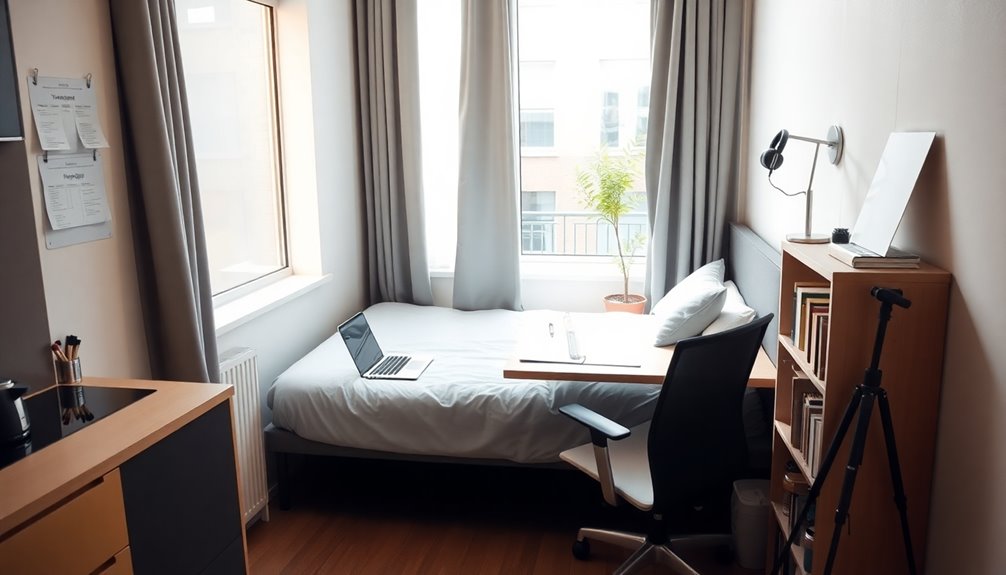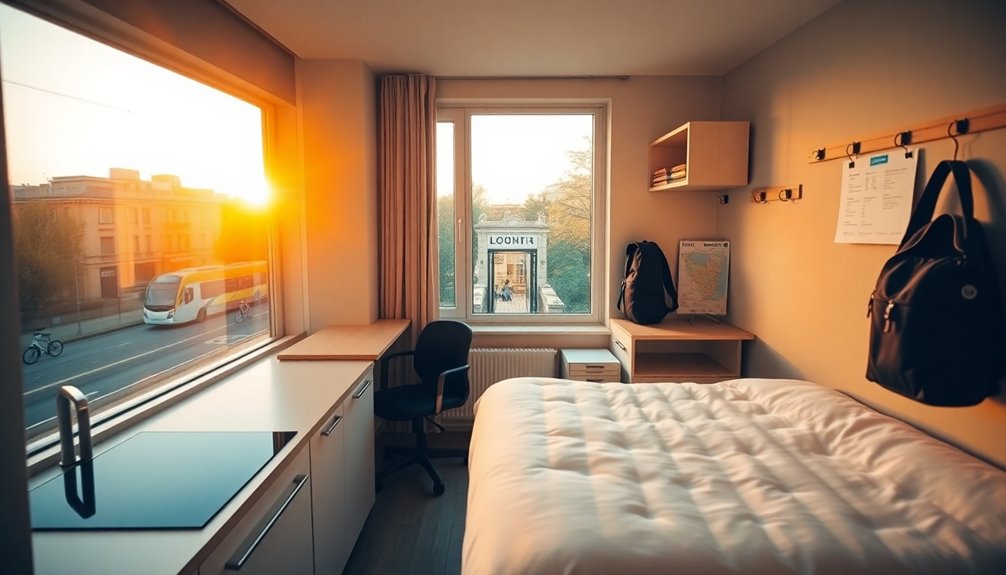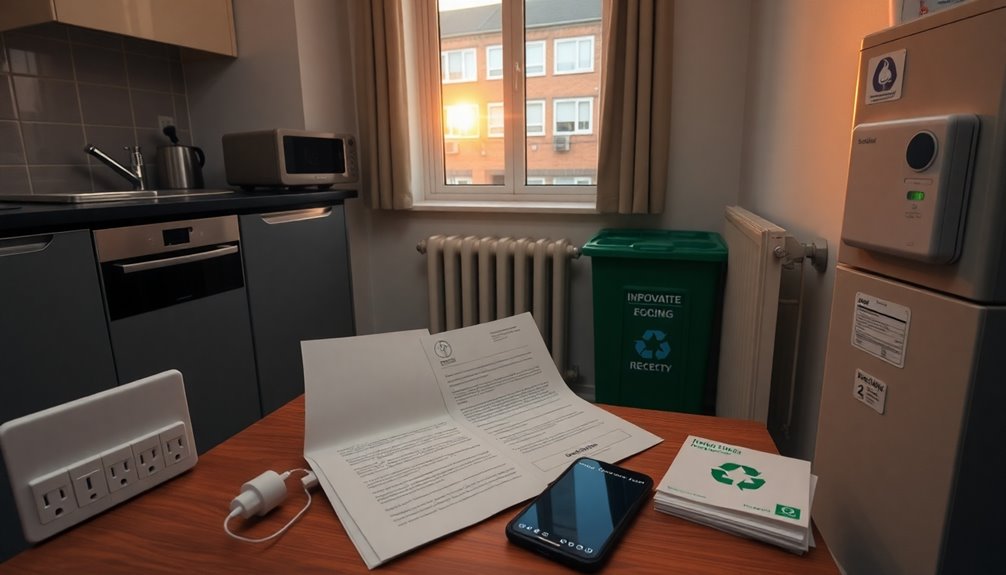
Choose a studio near your language school and good transport so you’ll commute under 30 minutes and join study groups easily. Furnish an ergonomic desk, supportive chair and layered lighting to protect focus. Create a quiet study corner with minimal gadgets, labelled supplies and a do-not-disturb signal. Practice speaking daily—record short sessions and seek language partners. Manage tenancy, bills and local rules to avoid issues. Follow simple safety and cultural tips, and keep going to uncover practical how-to steps.
Highlights
- Choose a studio within 20–30 minutes’ walk or public transit of your language school for convenience and immersion.
- Furnish an ergonomic study area: adjustable desk, supportive chair, and layered task plus ambient lighting.
- Create a distraction-free study corner with natural light, noise-cancelling headphones, and minimal gadgets.
- Set daily speaking goals: 5–10 minutes of recorded practice and one new phrase or short dialogue each day.
- Understand tenancy terms, bills, and local rules; keep receipts and contact the Residential Tenancies Board for disputes.
Choosing a Studio Near Your Language School and Transport Links

When you’re picking a studio, prioritize proximity to your language school and reliable transport links so you don’t waste time commuting or miss classes; ideally aim for a place within a 20–30 minute commute by foot or public transit. You’ll gain freedom to structure study and leisure without long journeys. Check transport accessibility at different times and verify connections to evening classes or weekend routes. Assess school proximity to save energy and increase immersion opportunities like study groups or language cafés. Balance rent with commute time, and choose a location that supports independence, punctuality, and a sustainable daily routine.
Furnishing Essentials for Comfortable Study Sessions
Because long study sessions demand focus, you’ll want a compact setup that supports posture, lighting, and organization without taking over the room. Choose ergonomic furniture—a supportive chair and adjustable desk—to prevent fatigue and keep you mobile between classes or city explorations. Prioritize layered lighting: a bright task lamp plus ambient lights avoids eye strain. Keep study supplies tidy in a few drawers or bins so materials are reachable but out of sight when you want freedom to relax. Add a small shelf for reference books and a corkboard for quick notes. Simple, adaptable pieces keep the flat versatile and efficient.
Setting Up a Distraction-Free Study Corner
Although it’s tempting to study wherever there’s space, carving out a dedicated, distraction-free corner will help you focus and study more efficiently. Choose a quiet spot with natural light, a compact desk, and a comfortable chair so you’ll want to spend time there. Limit gadgets to essentials and use noise-cancelling headphones when needed. Keep supplies within reach and use simple organization tips: labeled bins, a cable tidy, and a minimal bulletin board. Set clear boundaries—study hours and a do-not-disturb signal—to protect your concentration. This intentional study space supports productivity while preserving your freedom and routine.
Boosting Spoken English With Daily Routines and Conversation Practice
Try to build at least one short, daily routine that focuses on speaking—five to ten minutes of shadowing a podcast, describing your day aloud, or rehearsing a short dialogue—and you’ll see steady improvement. You can pair this with simple goals: one new phrase per day, short role-plays, or timed monologues. Use practice routines that fit your schedule and space; record yourself, review pronunciation, and note progress. Seek brief exchanges with neighbors or language partners to apply daily conversations naturally. Consistency beats intensity: small, portable habits give freedom and momentum, turning practice into real spoken confidence.
Managing Bills, Tenancy, and Local Regulations in Ireland

When you move into a private studio in Ireland, getting on top of bills, tenancy rules, and local regulations from day one will save you time and stress. You’ll check tenancy agreements carefully: duration, deposit return, notice periods, and repair responsibilities. Set up simple bills management—register utilities, compare providers, and automate payments to avoid penalties. Know local council waste rules, noise bylaws, and tenant rights under Irish law so you can live freely without surprises. Keep records: receipts, correspondence, and inventory. If disputes arise, contact the Residential Tenancies Board or seek free local advice to resolve matters quickly.
Using Local Resources and Community Events to Improve Fluency
You can boost your speaking skills by joining neighborhood language exchanges where locals and learners meet regularly. Attend cultural meetups to practice conversation in real contexts and learn idiomatic expressions. Volunteering locally also gives you practical speaking opportunities and helps you connect with the community.
Join Neighborhood Language Exchanges
If you want to boost everyday speaking skills fast, join neighborhood language exchanges where locals and learners meet informally to practice conversation, swap tips, and share cultural insights. You’ll find language partners at cafes, libraries, or bulletin boards near your studio flat. Go regularly, set clear goals for each session, and rotate partners to expose yourself to varied accents and slang. Bring short prompts, listen actively, and ask for corrections kindly. These exchange events are low-cost, flexible, and social—perfect if you value independence and want steady progress without rigid classroom schedules. Keep sessions fun and focused.
Attend Cultural Meetups
Neighborhood language exchanges are great for sharpening conversation, but to hear language used in broader cultural contexts you should also attend local cultural meetups. You’ll find film nights, food festivals, book clubs and craft workshops where native speakers relax into their routines. Choose events that match your interests to make practice feel freeing rather than forced. Cultural immersion at these gatherings boosts vocabulary tied to everyday life and etiquette, while community engagement builds contacts who’ll correct you naturally. Go regularly, listen first, then speak. Be open, curious, and respectful — that approach speeds fluency and fits a flexible lifestyle.
Use Local Volunteer Opportunities
When you volunteer locally, you’ll get regular, low-pressure chances to use the language while helping others. You can pick causes that match your interests, giving you freedom to choose commitment levels and build community involvement naturally. Tasks like teaching, event support, or mentoring force practical conversation and boost your confidence. That real-world practice accelerates skill development more than drills, and you’ll form local connections that make the city feel like home. Balance your volunteer schedule with study and rest so it enhances rather than overwhelms your routine. Volunteering stretches your language abilities while letting you contribute meaningfully.
Quick Safety, Comfort, and Cultural Tips for Living Alone
Because you’ll be living alone for the first time, it’s useful to have a short checklist covering safety, comfort, and local customs so you can settle in quickly and confidently. Lock doors, test smoke alarms, and share your address with a trusted contact — basic safety precautions that keep you secure. Arrange practical comforts: compact bedding, blackout curtains, and a simple toolkit. Learn local cultural etiquette: greetings, noise norms, and recycling rules to avoid faux pas. Explore neighborhood essentials—pharmacy, transport, grocery—and register with your language school’s emergency contacts. Keep routines flexible so freedom and responsibility coexist.
Some Questions Answered
How Do I Find Short-Term Storage During Travel Between Courses?
Look for short term storage options like luggage storage apps, airport lockers, or local self-storage units; travel storage solutions such as hostel baggage holds or vetted courier services work too. You’ll compare price, location, insurance, and access hours, book online, and keep inventory photos. Choose flexible, refundable options so you’re free to change plans. Pack essentials separately and get receipts or tracking to avoid surprises while you’re on the move.
Can I Get a Dedicated Workspace for Online Exams in a Small Studio?
Hit the nail on the head — yes, you can get a dedicated workspace for online exams in a small studio. You’ll prioritize compact, multi-use furniture and noise control to create reliable workspace solutions for exam preparation. Use a fold-down desk, ergonomic chair, portable screen, and cable organizer; add headphones and a room divider or curtain for privacy. Keep lighting and internet stable, and practice setup before test day to reduce stress.
Are Pets Generally Allowed in Private Student Studio Flats?
Sometimes — pet policies vary by landlord and residence; many student studios restrict animals or allow only small pets with prior approval. You’ll need to check lease terms and ask about deposits, fees, or breed limits. As a tenant, you’re responsible for cleanliness, noise control, and any damage, plus proper vaccination and disposal of waste. If you want freedom with a pet, seek pet-friendly listings and get permissions in writing.
How Do I Register for a Local GP and Healthcare as an International Student?
Think of signing up as gaining access to a local healthcare map: first find a nearby GP, then register as a student. Bring your ID, visa, proof of address and student registration letter to the practice; they’ll add you to the list and explain NHS or private entitlements. You’ll get a medical record number and appointment access. Keep copies of documents, ask about emergency care, and update your details if you move to stay covered.
What Are Common Deposit Dispute Resolution Steps in Ireland?
You start by negotiating with the landlord, documenting issues and sending a formal written request for the deposit return. If that fails, you follow the resolution process: apply to the Residential Tenancies Board (RTB) or small claims court, supply evidence, and attend adjudication or hearing. You can use mediation services, appeal decisions, and enforce awards through the courts. Keep all receipts, photos, inventory reports, and correspondence to support your case.
Summing Everything Up
Living alone in a private studio while studying a language can feel intimidating, but it’s incredibly effective — studies show immersion and routine boost fluency faster than classroom time alone. You’ll get more from a place near your school and transport, a tidy study corner, and daily conversation practice with locals. Keep paperwork and bills sorted, use community resources, and stay safe. Stick to these tips, and you’ll progress confidently while enjoying independent life.
